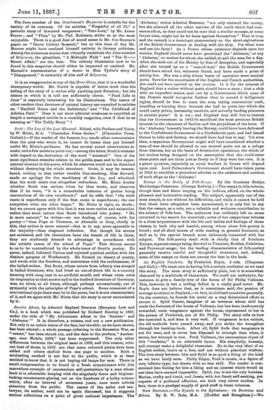Service Afloat, by Admiral Raphael Semmes (Sampson Low and Co.),
is a book which was published by Riehard Bentley in 1869, under the title of "My Adventures Afloat in the Sumter' and 'Alabama.' " It is, therefore, a reissue, and not a new publication. Not only is no notice taken of the fact, but the title, as we have shown, has been altered ; a whole passage referring to the Secession War, as "recent," has been struck out, and the date to the preface, "Anchor- age, near Mobile, 1868," has been suppressed. The only other differences between the original issue in 1869, and this reissue, with- out beat of drum, in 1887, are that some coloured plates have been added and others shifted from one page to another. Such a misleading method is not fair to the public, which is at least entitled to know that it is not baying old lamps for new. There is email compensation to be found in a fresh acquaintance with this marvellous example of unconscious self-portraiture by a man whose book is in admirable keeping with the singularly fierce and litigious. looking countenance glaring out on the forefront of a bulky volume which, after an interval of seventeen years, once more solicits attention from the public. The career of the sailor and sea- lawyer, its author, need not be again discussed, but it suggests serious reflections on a point of great national importance. The
'Alabama,' writes Admiral Semmes, "not only alarmed the enemy, but she alarmed all the other nations of the earth which had corn. merce afloat, as they weld not be sere that a similar scourge, at some future time, might not be let loose against themselves." That is true, and the remark is a trenchant commentary on the short-sightedness of the British Government in dealing with the ship. For what were and are the facts ? As a Power whose existence depends upon her marine, England should never have permitted the 'Alabama,' or any Alabama,' no matter for whom she raided, to sail the seas for a day. After she stole out of the Mersey by dint of deception, and especially after she turned up as a " manonf-war," the British Government should have seized her, wherever found, and have made a point of seizing her. She was a ship whose bases of operation were neutral ports. Save for the connivance of the Euglish and French authorities, she could not have carried on her cruises. Is it for the interest of England that a nation without ports should have a navy; that a ship with an imperfect statue, sent out by a Government which none of the Powers would recognise further than to accord it belligerent rights, should be free to roam the seas, taking commercial craft, boarding or burning them because she had no ports into which she could carry prizes, harasssing neutrals, and actually landing prisoners in neutral ports ? It is not; and England may still live to lament that her Government in 1862.64 sacrificed the most precious British interest to the clamours of faction and the prejudices of the hour. If the 'Alabama,' honestly leaving the Mersey, could have been delivered to the Confederate Government in a Confederate port, and had issued thence to take and destroy, we should have had less to say. Yet even then, a sagacious Government might well have considered whether a man-of-war should be allowed to use neutral ports not as a refuge from distress, but as the basis of deetructive operations, the whole of her cruises being designed on the assumption that she could enter these ports and use them just as freely as if they were her own. It is a grave question, especially as naval warfare in future will depend upon coal. Lord Palmerston's Government should have taken pains in 1862 to establish a precedent adverse to the existence and conduct of such ships as the 'Alabama.'


































 Previous page
Previous page